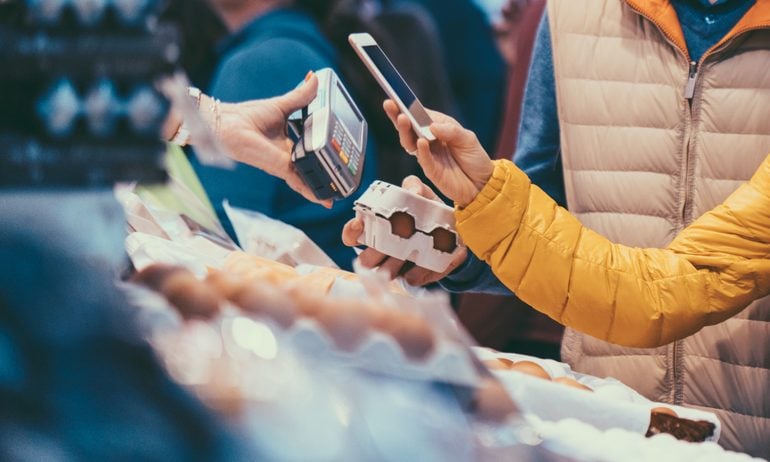Will Using a Digital Wallet Cost You in Credit Card Rewards?
Digital wallets are in wide enough use that you likely won't notice any issues with rewards when you use one. If you do, your issuer can typically correct it if you call in.

Many or all of the products on this page are from partners who compensate us when you click to or take an action on their website, but this does not influence our evaluations or ratings. Our opinions are our own.
You may have reasons for not using a digital wallet, but one thing you don't need to worry about is your ability to earn credit card rewards that way.
Years ago — when these cardless, contactless payment systems were still an emerging technology and not in widespread use — some problems did exist. But these days, it makes little to no difference whether you swipe, dip, opt for PayPal, or hold your phone over the payment terminal. In most cases, you'll get the cash back, miles or points that your credit card promises. And if you don't, you can contact your card issuer and often settle the matter.
In fact, some credit cards now specifically reward you for using a digital wallet: The Apple Card is a good example.
Exceptions and fine print do exist, of course. And it's worth understanding how digital wallets work so you can make sure no rewards slip through the cracks as your iPhone hovers over a scanner.
How digital wallets work
Major digital wallets like Apple Pay, Google Pay and Samsung Pay use a process called "tokenization." When you make a transaction, the digital wallet does not share with the merchant your actual credit card number but instead creates a one-time-use number, or token. This is similar to how the microchip embedded in your credit card works.
“You're likely to earn the rewards you're promised, and some credit card issuers even spell this out clearly in their terms and conditions.”
This tokenization helps keep your true card number secure. But your purchase will still be recorded as having been made with the merchant, not with Apple, Android/Google or Samsung. And from a rewards standpoint, this is crucial.
That's because credit card issuers rely on merchant category codes to determine whether your purchase qualifies for certain rewards. Those MCCs are assigned by the four major payment networks — Visa, Mastercard, American Express and Discover — depending on the nature of the merchant. A grocery store will have a different MCC than a purchase from Apple will, but using your digital wallet at Kroger still "codes" as a grocery store purchase.
Thus, you're likely to earn the rewards you're promised, and some credit card issuers even spell this out clearly in their terms and conditions.
American Express, for example, assures that Apple Pay users will get their rewards on compatible cards: “Yes, you receive all of the same rewards, security and benefits of your American Express Card when you use it with Apple Pay.” Apple Pay’s FAQ page backs this up as well: “When you pay using Apple Pay, you continue to get the rewards, benefits, and security that your credit, debit, or prepaid card provides.”
The same is true of digital payment methods like PayPal, which promise that "you can still earn your credit card points, miles and rewards" when you link your preferred rewards card.
Exceptions and fine print
While a digital wallet typically won't affect how a transaction "codes," there may be instances in which a merchant processes a purchase in an unexpected or incomplete way.
“If for some reason you're missing expected rewards for a transaction, call your issuer.”
This in fact was an issue for a time with the American Express® Gold Card, although AmEx says the problem has been largely addressed.
To this end, many issuers have disclaimers in their terms and conditions to cover themselves. For instance, Discover’s states on its site: “Purchases made through third-party payment accounts, mobile or wireless card readers, virtual wallets or similar technology will not be eligible if the technology does not provide sufficient transaction details for rewards qualification."
Generally, you'll earn the rewards you're promised when you use a digital wallet, but you may want to check your statement to make sure. If for some reason you're missing expected rewards for a transaction, call your issuer to address the matter.
Benefits of digital wallets
Rewards aside, opting for a digital wallet can prove more convenient and secure than carrying around your physical cards. As noted, once you add your card details to your payment app of choice, your card number is never shared with a merchant when you pay, and you won’t have to worry about someone seeing your card information either.
Plus, a digital wallet might help you better organize and keep track of your cards. You can add multiple cards to your phone, rather than lugging around plastic in your actual wallet. This can save you time at the register as well as give you easier access to all your cards.
Keep in mind that not all cards are compatible with digital wallets. Check your card issuer’s site for a list of cards that are eligible to be used digitally. You can also call your card's customer service number if you’re unsure.
» MORE: Don't fear your mobile wallet
Find the right credit card for you.
Whether you want to pay less interest or earn more rewards, the right card's out there. Just answer a few questions and we'll narrow the search for you.



